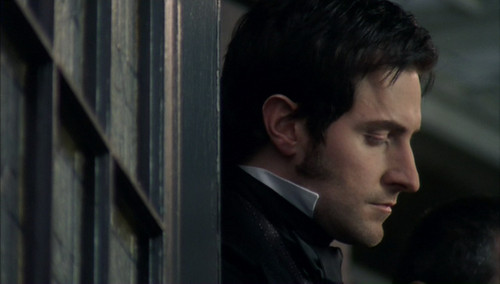An amusing take on who would constitute the ideal mate for modern girls (sexy monster vs wet toff, LOL) --presuming, of course, that modern girls all want the same thing, which we clearly do not. However, the winner (in Ms Freeman's opinion) is Canadian literary hero Gilbert Blythe. Well sure, maybe (as much as I am fond of Canadian men), but *cough* Gilbert is only, like, 12 when the novel begins. Yes, he grows into a man, but I sort of like hunky fictional types who are already men to begin with. But then, I'm not 14 anymore.
And come on, really? She mentions Will Ladislaw (honestly, ladies, how many of you have taken the time to read, or happen to have seen the 1994 film version of Middlemarch), but NOT the widely --and wildly-- adored John Thornton?!
Defies categorization:
Gaskell calls him a "True Man"
Further, Ms Freeman says:
It is often noted how little attention is given to female characters in pop culture aimed at men (which is to say, most pop culture). But the same can be said in reverse, including of literature that is largely read by girls and women. Austen never seemed very interested in her male characters beyond what financial security they could provide for her heroines, while the Brontës were incapable of writing male characters who were much more than overheated adolescent fantasies.
Quite possibly she has not read North and South by Elizabeth Gaskell. Mr Thornton's character is deep and developed indeed--in fact one of the main themes is that you cannot judge a book by its cover (which the snobbish Margaret initially does, despising Mr Thornton merely for hailing from the wrong part of England, and being a manufacturer). For those who have only seen the BBC miniseries: there is no beating-the-worker scene in the book; the producers evidently thought contemporary viewers wouldn't understand the subtleties of Victorian class distinction, and thus gave us a metaphorical beating as well. It is perhaps the most unforgivable part of the adaptation, in my view. But I digress.
Ms Freeman does raise some interesting points. Had I done my Master's degree, as planned (but I took up full-time, stay-home mothering instead--You're welcome, kids!!) I've always thought it would have made a good thesis to juxtapose the treatment/development of male characters by female authors, and female characters by male authors in Regency/Victorian/19thC. novels. (Thomas Hardy's female characters? Yikes.)
It begs the question of whether or not we are really capable of getting under the skin of the opposite sex and fully and fairly portraying their characters and personalities. Could I, as a woman, ever really "write" a good (realistic) male character? Or is it all either blaming, wishful thinking, or projecting? Food for thought, especially now with the increasing prominence of "gender dysphoria," and the hilariously contradictory claims of some feminists that--on the one hand, biology is completely irrelevant, yet on the other--men and women can never fully comprehend each other, and it constitutes "gender appropriation" to try and 'write' the opposite sex. (At least for men; it's OK for women to do this, because somehow it addresses historical oppression, or something. Plus women are naturally more wise and intuitive, as everyone knows. Which isn't sexist at all.)
.


No comments:
Post a Comment